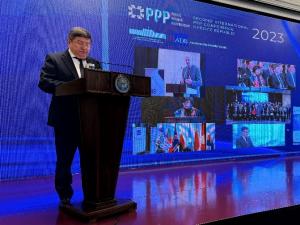Since 2009 when Public-Private Partnerships (PPPs) were introduced in Kyrgyzstan, 66 projects have been implemented in the country, providing access to critical public services to more than 1 million citizens. These PPP projects are the driving forces of the economic and social development in Kyrgyzstan in sectors such as healthcare, education, transport, and renewable energy.
But Kyrgyzstan is taking further steps towards the practical implementation of PPPs. "We need to make PPP one of the most important mechanisms in the implementation of the country's social and economic policy," the Chairman of the Cabinet of Ministers of Kyrgyzstan, Mr. Akylbek Zhaparov, said in his opening statement at the Second International PPP Conference in Bishkek, on 28-29 September 2023.
Kyrgyzstan’s progress to PPPs for the SDGs
Through several reforms and legislative amendments, the Chairman added, Kyrgyzstan is putting emphasis on “PPPs aligned with the SDGs that create value for people” in line with the UNECE approach to PPPs for the SDGs bringing “value for people” and “value for the planet”, on top of the traditional “value for money”. These reforms and legislative amendments promote:
-
The development of PPPs in the renewable energy sector to help the country achieve carbon neutrality by 2050,
-
The education sector to increase access to education, and
-
The transport sector to support, in particular, the implementation of cross-border projects.
Furthermore, to support the development of infrastructure projects in the country, a state development bank was established, and a guarantee and insurance mechanism was created.
Using the UNECE PPP and Infrastructure Evaluation and Rating System (PIERS)
As part of this conference, UNECE organized a seminar on 28 September for more than 55 Kyrgyz public officials and PPP practitioners on the use of the UNECE PPP and Infrastructure Evaluation and Rating System (PIERS).
The main objective of the seminar was to showcase and analyze the outcomes of the joint work by UNECE and representatives from Kyrgyz public entities on eight PPP and infrastructure projects assessed using the UNECE PIERS sustainability methodology. The assessment of these projects, covering public transport, education, renewable energy, healthcare and transport infrastructure, showed that most of them have a high potential to contribute to the SDGs, especially in access to essential services and job creation.
The seminar also discussed the prospects of future practical implementation of the evaluated projects, as well as the challenges and opportunities for scaling up PPPs for the SDGs in Kyrgyzstan.
By using PIERS, project developers and stakeholders can assess the strengths and weaknesses of their projects and identify areas for improvement to help – especially those at early stages of development – to better align them with the SDGs. Furthermore, PIERS can make projects more attractive to potential investors and debt providers, who increasingly choose to invest in projects with the highest Environmental, Social and Governance (ESG) credentials.
The seminar was the concluding event of a capacity building project “Towards Integrated National Financing Frameworks”, which aimed to assist Kyrgyzstan in identifying and implementing infrastructure projects that are aligned with the SDGs. The Second International PPP Conference in Kyrgyzstan was jointly organized by UNECE and the PPP Center of Kyrgyzstan, as well as other international partners including the Asian Development Bank (ADB) and the International Finance Corporation (IFC).


